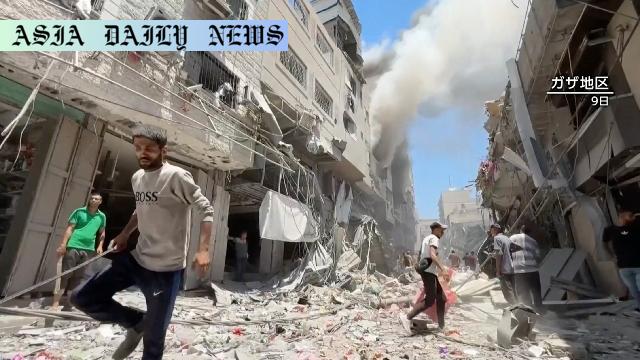Ceasefire: Gaza residents call for an urgent resolution to end the ongoing humanitarian crisis and violence through immediate peace talks.
Ceasefire talks between Israel and Hamas are underway in Qatar.
Gaza residents express an urgent need for a humanitarian resolution.
The death toll in Gaza has exceeded 57,762 since October 2023.
Key obstacles include aid distribution and Israeli military withdrawal.

The Dire Humanitarian Crisis in Gaza
The Gaza Strip, home to over two million people, is grappling with one of the worst humanitarian crises seen in recent history. The ongoing hostilities between Israel and Hamas have plunged the region into chaos, and the death toll has reached unprecedented levels. The desperation among residents is palpable as families face extreme shortages of food, water, electricity, and basic medical supplies. Speaking to NHK in Nuseirat, a central area in Gaza, one resident expressed his plea for peace, stating that people are risking everything merely to secure a meal. This dire situation highlights the urgency of reaching a ceasefire agreement to alleviate the immense suffering of civilians.
Ceasefire Talks: A Glimmer of Hope
Amid the escalating crisis, indirect ceasefire negotiations between Israel and Hamas are underway, mediated by Qatar. According to Hamas officials, the core issues being discussed revolve around the distribution of humanitarian aid and the potential withdrawal of Israeli forces from Gaza. While the talks offer a ray of hope, challenges remain in bridging the mistrust and addressing the deeply embedded tensions. A senior Israeli official hinted that a ceasefire coupled with the release of hostages might be attainable within the next two weeks. However, with every passing day, the human cost of the conflict continues to mount.
The Heartbreaking Toll on Families
The human cost of the war is staggering. On Thursday, Palestinian media reported that 16 lives, including those of 10 children, were tragically lost in Deir al-Balah due to an airstrike on a crowd gathered for nutritional aid. Stories like these underscore the vulnerability of Gaza’s population, especially its children, who now form the face of this unprecedented humanitarian tragedy. Health officials have confirmed that the conflict has claimed 57,762 lives since its outbreak in October 2023. Civilians have become collateral damage in this clash of ideologies and geopolitical strategies, raising urgent questions about the efficacy of international intervention and the protection of human rights.
Urgency in International Intervention
Global leaders and human rights organizations must step up to facilitate immediate action. The United Nations has repeatedly called for an immediate humanitarian truce to allow the unhindered delivery of lifesaving aid. Still, the logistics of aid distribution remain a battlefield in itself, with both sides pointing fingers. The leadership vacuum in resolving this conflict has led to prolonged suffering for Gaza’s residents while frustrating diplomatic efforts. The role of mediators like Qatar becomes essential here, as they work to strike a balanced resolution while ensuring the safety and dignity of those caught in the crossfire.
The Path Forward
While the talks in Qatar unfold, the residents of Gaza await not only a cessation of violence but also the meaningful rebuilding of their lives. Post-conflict rehabilitation, the establishment of a long-term peace agreement, and accountability measures will be critical steps once a truce is reached. As residents plead for the fighting to end, the region simultaneously brims with resilience, witnessed in people’s determination to rebuild amidst unimaginable adversity. The international community must not only advocate for an end to hostilities but also commit resources to rebuild infrastructure, empower local governance, and enable sustainability in Gaza for generations to come.
Commentary
The Tragic Cost of Prolonged Conflict
Reading about the plight of Gaza residents is truly heartbreaking. It’s unfathomable to think that in today’s world, over 57,000 people could lose their lives in a matter of weeks, and thousands more are left grieving, displaced, and stripped of their most basic human rights. The images of children killed while queuing for nutritional aid are especially harrowing; they remind us of the indiscriminate and inhumane costs of war. In this modern era, it is a collective failure that such violence and suffering persist unchecked.
The Case for Urgent Ceasefire
A ceasefire is not just an urgent need for Gaza; it is a moral imperative for the entire global community. Every day of delay costs more lives, destroys more families, and edges the region further from peace. The ongoing talks in Qatar are a glimmer of hope, but hope alone is not enough. Policymakers and global leaders must ensure that these talks are not derailed by political posturing. Their success matters not just for the combatants but for the desperate civilians trapped in the crossfire who deserve nothing less than immediate action.
Global Responsibility and a Call to Action
The world cannot stand idly by while innocent lives are lost, especially in numbers as staggering as these. Humanitarian aid must be allowed to flow freely into Gaza, and ceasefire terms should prioritize the immediate well-being of civilians. Global leaders, particularly those with influence in the region, must act decisively to mediate, de-escalate, and enable meaningful reconstruction after the ceasefire. History will judge how we, as a global community, respond to moments like this. Let’s ensure that future generations remember our commitment to humanity and justice, not our failures to prevent loss.


